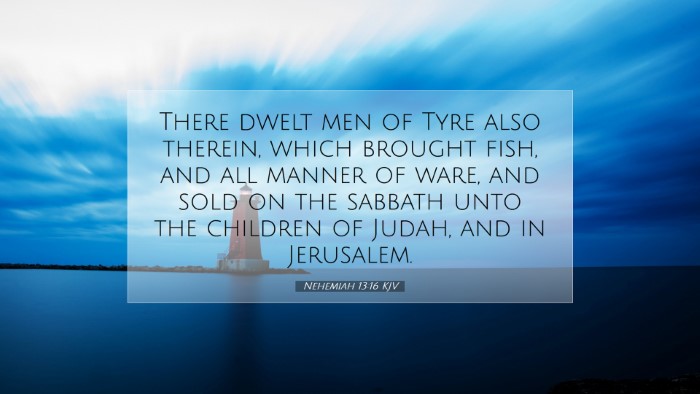Commentary on Nehemiah 13:16
Nehemiah 13:16 states: “There dwelt men of Tyre also therein, which brought fish, and all manner of ware, and sold on the sabbath unto the children of Judah, and in Jerusalem.” This verse highlights the ongoing struggle of the Israelites to maintain their covenantal faithfulness, particularly regarding the observance of the Sabbath. In this commentary, we will synthesize insights from established public domain commentaries, drawing from the works of Matthew Henry, Albert Barnes, and Adam Clarke.
Contextual Background
The Book of Nehemiah chronicles the return of the Jews from Babylonian exile and the rebuilding of Jerusalem's walls. Nehemiah's leadership reflects the necessity of religious reformation alongside the physical restoration of the city. This specific verse occurs in a section where Nehemiah addresses the problematic issue of commerce on the Sabbath, underscoring the tensions between the Hebrew community and surrounding nations.
Insights from Commentaries
Matthew Henry's Commentary
Observance of the Sabbath: Matthew Henry notes that the arrival of the Tyrians in Jerusalem brought about a significant challenge to the obedience of the Jewish people. The commerce they conducted—bringing fish and other goods—directly contravened the Sabbath laws that were meant to set the Israelites apart as God's chosen people. Henry contemplates the motives of the Tyrians, suggesting they exploited the Israelites' desire for trade at the expense of divine instructions.
Spiritual Implications: Henry emphasizes that the observance of the Sabbath is not merely a command but a means of spiritual respite. By neglecting this sacred time, the Israelites risked their spiritual vitality. He reminds us that worship and rest are integral to maintaining a healthy relationship with God.
Albert Barnes' Commentary
Commercialization of the Sabbath: Albert Barnes points out that the practice of buying and selling on the Sabbath was a source of contention in ancient Israel. He notes that the Tyrians, as foreign merchants, were unapologetic about their actions. Their commercial interests clashed with the sacred observance of the Sabbath. This conflict reflects the broader theme of Israel's struggle against external influences that sought to undermine their faith and practices.
Implications for the Jewish Community: Barnes raises the importance of community action against such practices. He mentions that the people of Judah should have recognized their responsibility to uphold the laws given to them. The infiltration of foreign practices posed a risk to their cultural and religious identity, and he calls for vigilance against these encroachments.
Adam Clarke's Commentary
Historical Context: Adam Clarke elaborates on the historical significance of Tyre, a prominent Phoenician city known for its commerce. He indicates that the presence of Tyrians selling goods in Jerusalem demonstrates both the economic dependencies of the Hebrew people and the perils of compromising their standards. The transaction of goods on the Sabbath is seen as a direct affront to God's commands.
Call to Reformation: Clarke underscores the necessity for reform within the leadership. Nehemiah’s role as a governor is pivotal; he must not only call the people to observe the Sabbath but also lead by example. Clarke encourages a reflection on how spiritual leaders today must address similar challenges within their communities.
Theological Reflections
This verse and the surrounding context invite reflection on several theological principles:
- Sanctity of the Sabbath: The command to keep the Sabbath holy extends beyond the avoidance of work; it encompasses the invitation to spiritual rest and communion with God.
- Cultural Influences: The interaction with foreign nations serves as a reminder of the delicate balance between engaging with the world and remaining set apart in holiness.
- Community Accountability: The collective responsibility of the Israelite community challenges modern churches to consider their role in protecting sacred practices and values.
Conclusion
Nehemiah 13:16 serves as a poignant reminder of the challenges faced in maintaining spiritual integrity within a commercialized and often conflicting cultural landscape. Drawing from the insights of Henry, Barnes, and Clarke, we are called to examine our own practices regarding the Sabbath and consider how we can better honor God in our commitments. Pastors, students, and theologians are urged to uphold the sanctity of sacred time and to reflect on the broader social and spiritual implications of our actions, emphasizing the need for community vigilance and reform.


